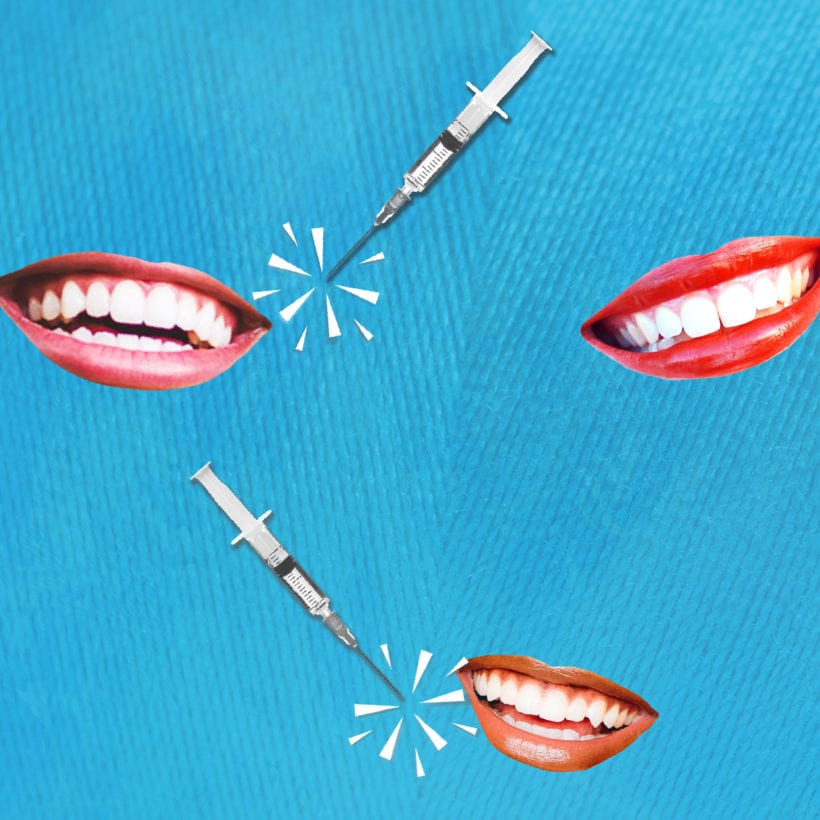We all know some of the common ways that stress can throw off our physical and mental wellbeing — from tummy troubles to headaches to breakouts. And as we wrap our heads around the fact that we’re almost entering the third year of this stressful global pandemic, we’re also discovering lately that stress can even have a major effect on our oral and dental health.
Research has found an association between long-term stress and poor oral health: “When we are stressed, our immune system doesn’t perform as well as expected. That’s because the stress hormone — cortisol — is responsible for suppressing the efficiency of the immune system,” says Amber O’Brien, a dentist at Mango Clinic. This means that, when we are under stress, our body’s natural ability to ward off bacterial invasion is automatically reduced. Because the immune system is “responsible for protecting the body against bacterial infection, it can’t work efficiently against the bacteria that cause periodontal disease while putting you at a higher risk of [conditions like] gum inflammation,” she says.

In addition to stress weakening our immune systems that help keep our gums and teeth healthy and strong, stress can encourage people to cope in harmful ways that contribute to bad oral health. “A stressed person carelessly adopts bad behavioral and eating habits that weaken immunity,” she says. For instance, someone who’s stressed could resort to a poor diet (like overloading on sweets) that contributes to tooth decay. The daily nightcap that you think is taking the edge off your stress could also be full of acidity and sugar that can be negatively affecting your oral health. Further, stressed individuals might forget — or not have the energy — to brush our teeth and floss regularly, which is rule number one in caring for your pearly whites and gums.
Read on for how stress can contribute to poor oral health as an encouragement to dedicate yourself to finally commit to ways that add more calm to your life.
Teeth Grinding
Nearly 40 million people in the U.S. grind their teeth when they sleep. Also known as bruxism, teeth grinding is a very common side effect of stress. The pressure on the teeth and gums from excessive grinding can lead to “gum recession and the creation of gingival pockets, jaw pain, damage to the enamel, and abnormal tooth wear,” says Henry Hackney, a dentist at Authority Dental. It can even cause someone to lose or break their teeth in severe cases. Your dentist will be able to detect right away if you grind your teeth at night with your routine exam. As you figure out ways to alleviate stress that causes bruxism, consider wearing a tooth or mouth guard at night to protect your teeth from damage.

TMJ and Jaw Pain
Another side effect of bruxism is that it can also lead to disorders of your temporomandibular joint (TMJ) — this is the joint found below your ear that helps you move the lower part of your jaw. Stress can make you unknowingly clench your jaw throughout the day. Repeated clenching can cause a popping sensation of your jaw in addition to oral pain from the tension and pressure. TMJ can throw off the alignment of your teeth and make your enamel more sensitive.
Canker or Cold Sores
When people experience stress, often they “tend to bite the inside of their cheeks or accidentally cause minor mouth injuries,” says Hackney. This can result in canker sores, which are harmless mouth ulcers that usually go away on their own, but are annoying and painful to deal with in the interim. There are prescription and over-the-counter creams that are safe to use on your gums to help alleviate the pain as the canker sores heal.
Gingivitis and Other Gum Disease
Stress makes it more difficult to avoid and fight off infections like gingivitis, which is an early stage of periodontal disease. “The gum inflammation is caused by plaque build-up [and the] gums are irritated and tend to easily bleed during brushing or flossing,” he adds, noting that there isn’t yet irreversible damage or gum recession yet and “teeth are not usually affected” yet. “If left untreated, gingivitis may proceed to periodontitis, which is a more serious form of periodontal disease.” At this stage, the gums start to recede and “pull away from teeth, creating small pockets where bacteria accumulate. Then, inflammation and plaque spread below the gum line lead to bone loss and loose or shifting teeth,” he says.
Nail Biting
Many people resort to biting their nails as a result of stress and boredom, but research shows the bad habit not only erodes your teeth, but it can push your teeth out of place over time. Plus, nail biting is also a surefire way to transfer germs from your fingers to your mouth, which can lead to oral infections, warts, and viruses that can also affect the rest of your body. Call this the perfect excuse to get regular manicures to avoid biting your nails (and chipping a mani).
We only recommend products we have independently researched, tested, and loved. If you purchase a product found through our links, Sunday Edit may earn an affiliate commission.








